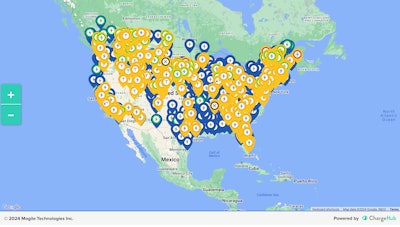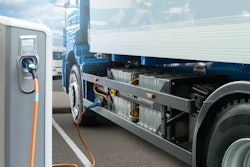
A lack of charging infrastructure available for large trucks has been a major barrier to fleets adopting electric vehicles in the U.S., but as the number of charging stations grow, another barrier is presenting itself: the magnitude of payment systems.
There are now more than 64 EV charging networks in the U.S. and more than 100 in the U.S. and Canada combined. And the charging infrastructure is very fragmented, leading to payment compatibility issues, said ChargeHub CEO Simon Ouellette.
EV roaming hub ChargeHub, which enables activation and payment on more than 80,000 charging stations in the U.S. and Canada, has partnered with payment processor and fleet fuel card provider Comdata to take steps to solve those issues and make the EV charging market easier for fleets to navigate.
The partnership expands access to more than 20 charging networks for Comdata customers via the ChargeHub PassportHub solution, which streamlines EV roaming through a single technical, commercial, accounting and legal integration. It also helps drivers using Comdata to limit downtime by planning and optimizing routes with ChargeHub’s extensive public charging information.
“Optimizing schedules and limiting stops are important to ensure the profitability and full potential of electrified fleets. This makes it even more important for commercial fleet managers to have the simplest possible option when it comes to charging their large numbers of vehicles. Using a single solution to charge is the solution that enables the scaling of charging operations across multiple networks,” Oullette said. “With tens of thousands of fleets and over a hundred (and growing) charging network operators throughout the U.S. and Canada, strategic partnerships like this one are an absolute must to enable seamless access to public charging to fleet drivers in a timely way. Most charging networks simply don't have the bandwidth to connect to each fleet and fleet solution provider individually. Likewise, fleets and fleet solution providers cannot spend all their time and resources building new solutions from scratch, defining individual legal and business agreements, and maintaining ongoing individual accounting reconciliation with every charging network.”
John Donahue, vice president of EV product and GTM strategy at Comdata parent company FLEETCOR, said the solution Comdata is building with ChargeHub is a step toward providing universal payment acceptance across charging networks.
“Think about your internal combustion engine (ICE) fueling experience today. Locations are abundant, and the experience is similar across all of the fueling merchants. That is not so for fleet EV drivers. There are multiple charging types, speeds and payment acceptance methods,” Donahue said. “Being able to find a compatible nearby charger that is available and that can get you back on the road as quickly as possible are top priorities for the fleet driver. Today, drivers end up downloading multiple apps to find charging locations and manage payments at multiple (charging networks). This is highly inefficient and creates a poor user experience.”
He said the driver’s experience is critical to fleet EV adoption because bad driver experiences can derail reaching sustainability goals.
Heavy-duty trucking, Donahue said, is at the epicenter of reaching net zero emissions goals. According to data from the U.S. Environmental Protection Agency, the transportation sector accounted for 37% of total U.S. greenhouse gas emissions in 2019. Medium- and heavy-duty vehicles accounted for 26% of transportation GHG emissions despite accounting for about only 5% of vehicles on the road. He said targeting that 5% can really move the needle toward net zero.
But the current charging infrastructure was not built to handle a class truck – neither the physical size of the truck nor the charging speed – as these trucks typically require charging speeds of at least 350 kwh and enough room to pull a trailer through without unhitching, Donahue said.
“Trucking is the backbone of our economy, so it is critical we help solve these challenges. The heavy-duty journey to net zero will take time and require the utilization of bridge fuels (i.e. bio diesel, CNG, LNG, Hydrogen),” he said. “Our solution is technology-agnostic. Today, our customers can leverage Comdata Chargepass across all fueling technologies. As the infrastructure for charging heavy-duty trucks gets built, the capabilities we are building with ChargeHub can be applied beyond passenger vehicles to heavy-duty and medium-duty transportation."












